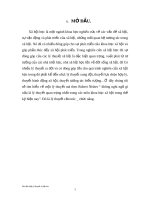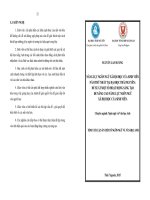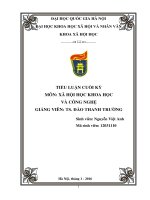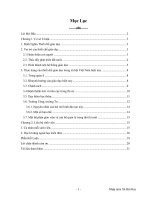TIỂU LUẬN NGÔN NGỮ XÃ HỘI HỌC
Bạn đang xem bản rút gọn của tài liệu. Xem và tải ngay bản đầy đủ của tài liệu tại đây (98.52 KB, 7 trang )
SOCIOKINGUISTIC PROJECTS
Student Name: Nguyễn Thị Ngọc
Student code: 7052900519
Class: Nghe An 6
Topic: Examine the differences between the English spoken in Boston and the
English spoken in the southern area of the United States. Why do you think there
are such dialectal evidence?
******************************************
I. Introduction
The British actually introduced the language to the Americas when they reached
these lands by sea between the 16th and 17th centuries. At that time, spelling had
not yet been standardised. It took the writing of the first dictionaries to set in stone
how these words appeared. In the UK, the dictionary was compiled by Londonbased scholars. Meanwhile, in the United States, the lexicographer was a man
named Noah Webster. Allegedly, he changed how the words were spelled to make
the American version different from the British as a way of showing cultural
independence from its mother country.
II. Differences
The English spoken in Boston and the southern area of the United States differ in
several ways, including pronunciation, vocabulary, and grammar.
1. American vs. British accent
Prior to the Revolutionary War and American independence from the British in
1776, American and British accents were similar. Both were rhotic i.e. speakers
pronounced the letter R in hard. Since 1776, the accents diverged but English
accent in America has changed less drastically than accents in Britain.
Towards the end of the 18th century, non-rhotic speech took off in southern
England, especially among the upper class; this "prestige" non-rhotic speech
was standardized, and has been spreading in Britain ever since.
Most American accents, however, remained rhotic.
There are a few fascinating exceptions: New York and New England accents
became non-rhotic, perhaps because of the region's British connections. Irish
and Scottish accents, however, remained rhotic.
To be fair, both American and British English have several types of accents and
there is no one true American or British accent.
2. Spoken English Differences
Full rhoticity is one instance of this, simply the pronunciation of the "R" in a word
by American English speakers as opposed to British ones. This is best shown by
the term "Fire," for instance. American English speakers would say it with a "fi-er"
sound, whereas British English speakers would say it with a "fi-yah" sound.
Many current British English dialects don't use full rhoticity because of a late-18thcentury trend in the south of UK. Being of a higher social level, the aristocracy
started removing their R's, which the ordinary British people then adopted. The
usage of rhoticity is still prevalent in certain areas, although non-rhoticity has
started to have an impact.
3. Written English Differences
However, the most noticeable distinction between American and British English is
their written forms. This is because writers created the earliest dictionaries in each
nation with different linguistic viewpoints. Scholars in London assembled the
British dictionary with the simple goal of collecting all recognized English terms.
Noah Webster, a lexicographer who aimed to simplify spelling, established the
American dictionary.
Various terms, such as "colour" and "honour," which were altered to "color" and
"honor," and "judgement," which is written "judgment" in American English, are
instances of words with different spellings.
In terms like "colourise" and "hypnotise," which are written "colorize" and
"hypnotize" in the Americanized versions of the languages, the British "s" is often
replaced with the letter "z." In American English, words that finish in the letters
"re" in British English, such as "centre" and "theatre," are often spelled with a "er."
4. Vocabulary differences
The vocabulary is the most obvious difference between American English and
British English. Numerous standard terms have diverse meanings. For instance,
Americans refer to a car's front end as the hood, whereas the British refer to it as
the bonnet.
While Britons have holidays or hols, Americans go on vacation.
Londoners live in flats, whereas New Yorkers reside in apartments. There are a lot
more instances than we can list here. The majority of Americans and Britons,
fortunately, can typically infer the meaning from the context of a statement.
5. Grammar differences
Aside from spelling and vocabulary, there are certain grammar differences between
British and American English. For instance, in American English, collective nouns
are considered singular (e.g. The band is playing). In contrast, collective nouns can
be either singular or plural in British English, although the plural form is most
often used (e.g. The band are playing).
The British are also more likely to use formal speech, such as ‘shall’, whereas
Americans favour the more informal ‘will’ or ‘should’.
Americans, however, continue to use ‘gotten’ as the past participle of ‘get’, which
the British have long since dropped in favour of ‘got’.
‘Needn’t’, which is commonly used in British English, is rarely, if at all used in
American English. In its place is ‘don’t need to’.
In British English, ‘at’ is the preposition in relation to time and place. However, in
American English, ‘on’ is used instead of the former and ‘in’ for the latter.
6. Differences in use of tenses
In British English the present perfect is used to express an action that has
occurred in the recent past that has an effect on the present moment. For
example: I've misplaced my pen. Can you help me find it? In American English,
the use of the past tense is also permissible: I misplaced my pen. Can you help
me find it? In British English, however, using the past tense in this example
would be considered incorrect.
Other differences involving the use of the present perfect in British English and
simple past in American English include the words already, just and yet.
British English: I've just had food. Have you finished your homework yet?
American
English: I
just
had
food. OR I've
just
had
food.
I've already seen that film. OR I already saw that film.
7. Differences in the use of Prepositions
There are also a few differences between British and American English in the
use of prepositions. For example: While the British would play in a team,
Americans would play on a team. Another example: While the British would go
out at the weekend, Americans would go out on the weekend.
8. Differences in Verb usage
American and British English may also use a base verb in different manners.
For example: For the verb " to dream", Americans would use the past
tense dreamed while the British would use dreamt in past tense. The same
applies to "learned" and "learnt". Another example of differing past tense
spellings for verbs in American and British English is "forecast". Americans
use forecast while the British would say forecasted in simple past tense.
III. Conclusion
These dialectal differences likely arose due to various factors, including
historical settlement patterns, immigration, and cultural influences. For
example, Boston English has been influenced by the city's early Puritan settlers
from England, while southern English has been influenced by the region's
history of slavery and African American Vernacular English.
Overall, dialectal differences in English across different regions of the United
States reflect the diversity of the country's population and its complex history.
References
/> /> /> />









